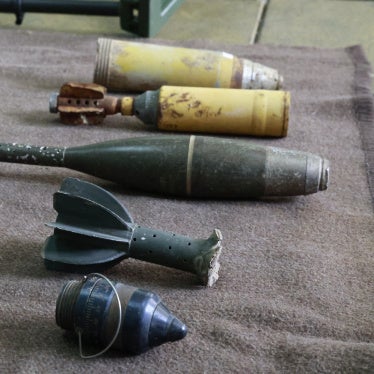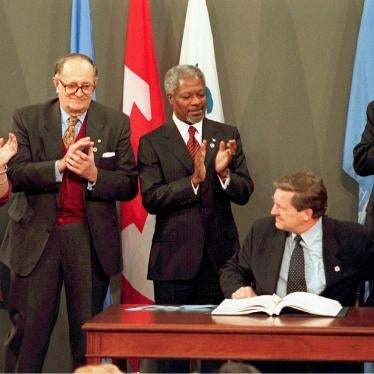In September 2011, representatives of 131 states met in Beirut for the Second Meeting of States Parties to the 2008 Convention on Cluster Munitions. Strong support for the convention was evident from the large number of participants, including from 40 observer states, from the strong language of the Beirut Declaration condemning the use of cluster munitions by any actor,[1]and from official statements by governments demonstrating their commitment to eliminating cluster munitions and the harm they cause. As the head of the United Kingdom delegation appealed to the meeting, “The fact that countries are still using cluster munitions that cause unacceptable harm to civilians should enrage us. We should not have to have this conversation again. The Beirut declaration must be the moment where we say: let this end, enough is enough.”[2]
Despite the solid and growing support for the Convention on Cluster Munitions, an alternative instrument that would threaten its underlying purpose and comprehensive obligations is set to be discussed and possibly adopted by the Fourth Review Conference of the Convention on Conventional Weapons (CCW). The proposed CCW protocol (“the draft protocol”) circulated on August 26, 2011 would allow continued use of cluster munitions and would offer weaker protections to civilians in armed conflict than the Convention on Cluster Munitions. It could thus decrease the stigma surrounding the weapons and hinder universalization of the absolute ban on cluster munitions. Recognizing the danger of the proposed protocol, a representative from Austria urged states parties to the Convention on Cluster Munitions to “speak out strongly against any action contrary to the core principles of the convention” and ensure that “universalization of the convention remains high on our agenda” because “the norm and stigma against cluster munitions is by no means secured. In our view, there is even a potential challenge to the very fundamentals of the Convention on Cluster Munitions that is taking place in the context of the negotiations of the CCW in Geneva.”[3]
In addition to competing with the standards set by the Convention on Cluster Munitions, the possible adoption of a weaker instrument on cluster munitions following a strong one raises concerns in the context of international law. The adoption would be inconsistent with established legal principles and practices and could in fact have adverse effects on the development of international humanitarian law and international law more generally.
This memorandum provides background on the already lengthy CCW negotiations and the existing legal regime governing cluster munitions. It then examines the draft protocol through the lens of international humanitarian law. The draft protocol is contrary to the humanitarian purpose of that field of law, and it would represent an unprecedented weakening, which would set an unfortunate example for future treaties. Finally, the memorandum explores the general trend that international treaty law becomes progressively stronger over time, illustrates how the draft protocol runs against this trend, and discusses how the draft protocol would create an undesirable conflict with the Convention on Cluster Munitions.
We call on all states at the Review Conference, especially those that have joined the Convention on Cluster Munitions, to express their concerns with the draft protocol and demonstrate that there is no consensus on the adoption of the draft protocol. CCW states parties should bring their decade of discussions on cluster munitions within the CCW forum to an end at the Fourth Review Conference. The Convention on Cluster Munitions is the appropriate legal means to address cluster munitions and the harm they cause, and states should devote their energies to implementing and universalizing that instrument.
[1]First Meeting of States Parties to the Convention on Cluster Munitions, “Revised Draft 2011 Beirut Declaration,” September 5, 2011, http://www.clusterconvention.org/files/2011/05/Draft-Beirut-Declaration-... (accessed November 10, 2011).
[2]Statement by the United Kingdom, to the Second Meeting of States Parties to the Convention on Cluster Munitions, Beirut, September 13, 2011, http://www.clusterconvention.org/msp/2msp/day-1-general-exchange-of-views/ (accessed November 10, 2011), p. 3.
[3]Statement by Austria, to the Second Meeting of States Parties to the Convention on Cluster Munitions, Beirut, September 13, 2011, http://www.clusterconvention.org/msp/2msp/day-1-general-exchange-of-views/ (accessed November 10, 2011), p. 2.







